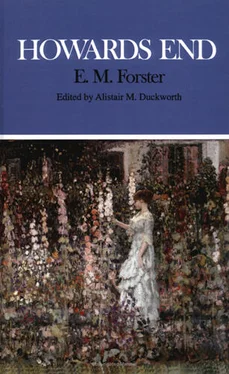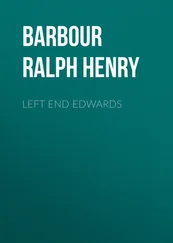Edward Morgan Forster - Howards End
Здесь есть возможность читать онлайн «Edward Morgan Forster - Howards End» весь текст электронной книги совершенно бесплатно (целиком полную версию без сокращений). В некоторых случаях можно слушать аудио, скачать через торрент в формате fb2 и присутствует краткое содержание. Жанр: Классическая проза, на английском языке. Описание произведения, (предисловие) а так же отзывы посетителей доступны на портале библиотеки ЛибКат.
- Название:Howards End
- Автор:
- Жанр:
- Год:неизвестен
- ISBN:нет данных
- Рейтинг книги:3 / 5. Голосов: 1
-
Избранное:Добавить в избранное
- Отзывы:
-
Ваша оценка:
- 60
- 1
- 2
- 3
- 4
- 5
Howards End: краткое содержание, описание и аннотация
Предлагаем к чтению аннотацию, описание, краткое содержание или предисловие (зависит от того, что написал сам автор книги «Howards End»). Если вы не нашли необходимую информацию о книге — напишите в комментариях, мы постараемся отыскать её.
Howards End — читать онлайн бесплатно полную книгу (весь текст) целиком
Ниже представлен текст книги, разбитый по страницам. Система сохранения места последней прочитанной страницы, позволяет с удобством читать онлайн бесплатно книгу «Howards End», без необходимости каждый раз заново искать на чём Вы остановились. Поставьте закладку, и сможете в любой момент перейти на страницу, на которой закончили чтение.
Интервал:
Закладка:
In the morning she was gone. The note that she left, tender and hysterical in tone, and intended to be most kind, hurt her lover terribly. It was as if some work of art had been broken by him, some picture in the National Gallery slashed out of its frame. When he recalled her talents and her social position, he felt that the first passerby had a right to shoot him down. He was afraid of the waitress and the porters at the railway-station. He was afraid at first of his wife, though later he was to regard her with a strange new tenderness, and to think, "There is nothing to choose between us, after all."
The expedition to Shropshire crippled the Basts permanently. Helen in her flight forgot to settle the hotel bill, and took their return tickets away with her; they had to pawn Jacky's bangles to get home, and the smash came a few days afterwards. It is true that Helen offered him five thousands pounds, but such a sum meant nothing to him. He could not see that the girl was desperately righting herself, and trying to save something out of the disaster, if it was only five thousand pounds. But he had to live somehow. He turned to his family, and degraded himself to a professional beggar. There was nothing else for him to do.
"A letter from Leonard," thought Blanche, his sister; "and after all this time." She hid it, so that her husband should not see, and when he had gone to his work read it with some emotion, and sent the prodigal a little money out of her dress allowance.
"A letter from Leonard!" said the other sister, Laura, a few days later. She showed it to her husband. He wrote a cruel insolent reply, but sent more money than Blanche, so Leonard soon wrote to him again.
And during the winter the system was developed. Leonard realized that they need never starve, because it would be too painful for his relatives. Society is based on the family, and the clever wastrel can exploit this indefinitely. Without a generous thought on either side, pounds and pounds passed. The donors disliked Leonard, and he grew to hate them intensely. When Laura censured his immoral marriage, he thought bitterly, "She minds that! What would she say if she knew the truth?" When Blanche's husband offered him work, he found some pretext for avoiding it. He had wanted work keenly at Oniton, but too much anxiety had shattered him; he was joining the unemployable. When his brother, the lay-reader, did not reply to a letter, he wrote again, saying that he and Jacky would come down to his village on foot. He did not intend this as blackmail. Still, the brother sent a postal order, and it became part of the system. And so passed his winter and his spring.
In the horror there are two bright spots. He never confused the past. He remained alive, and blessed are those who live, if it is only to a sense of sinfulness. The anodyne of muddledom, by which most men blur and blend their mistakes, never passed Leonard's lips—
And if I drink oblivion of a day,
So shorten I the stature of my soul.
It is a hard saying, and a hard man wrote it, but it lies at the foot of all character.
And the other bright spot was his tenderness for Jacky. He pitied her with nobility now—not the contemptuous pity of a man who sticks to a woman through thick and thin. He tried to be less irritable. He wondered what her hungry eyes desired—nothing that she could express, or that he or any man could give her. Would she ever receive the justice that is mercy—the justice for by-products that the world is too busy to bestow? She was fond of flowers, generous with money, and not revengeful. If she had borne him a child he might have cared for her. Unmarried, Leonard would never have begged; he would have flickered out and died. But the whole of life is mixed. He had to provide for Jacky, and went down dirty paths that she might have a few feathers and dishes of food that suited her.
One day he caught sight of Margaret and her brother. He was in St. Paul's. He had entered the cathedral partly to avoid the rain and partly to see a picture that had educated him in former years. But the light was bad, the picture ill placed, and Time and Judgment were inside him now. Death alone still charmed him, with her lap of poppies, on which all men shall sleep. He took one glance, and turned aimlessly away towards a chair. Then down the nave he saw Miss Schlegel and her brother. They stood in the fairway of passengers, and their faces were extremely grave. He was perfectly certain that they were in trouble about their sister.
Once outside—and he fled immediately—he wished that he had spoken to them. What was his life? What were a few angry words, or even imprisonment? He had done wrong—that was the true terror. Whatever they might know, he would tell them everything he knew. He re-entered St. Paul's. But they had moved in his absence, and had gone to lay their difficulties before Mr. Wilcox and Charles.
The sight of Margaret turned remorse into new channels. He desired to confess, and though the desire is proof of a weakened nature, which is about to lose the essence of human intercourse, it did not take an ignoble form. He did not suppose that confession would bring him happiness. It was rather that he yearned to get clear of the tangle. So does the suicide yearn. The impulses are akin, and the crime of suicide lies rather in its disregard for the feelings of those whom we leave behind. Confession need harm no one—it can satisfy that test—and though it was un-English, and ignored by our Anglican cathedral, Leonard had a right to decide upon it.
Moreover, he trusted Margaret. He wanted her hardness now. That cold, intellectual nature of hers would be just, if unkind. He would do whatever she told him, even if he had to see Helen. That was the supreme punishment she would exact. And perhaps she would tell him how Helen was. That was the supreme reward.
He knew nothing about Margaret, not even whether she was married to Mr. Wilcox, and tracking her out took several days. That evening he toiled through the wet to Wickham Place, where the new flats were now appearing. Was he also the cause of their move? Were they expelled from society on his account? Thence to a public library, but could find no satisfactory Schlegel in the directory. On the morrow he searched again. He hung about outside Mr. Wilcox's office at lunch time, and, as the clerks came out said: "Excuse me, sir, but is your boss married?" Most of them stared, some said, "What's that to you?" but one, who had not yet acquired reticence, told him what he wished. Leonard could not learn the private address. That necessitated more trouble with directories and tubes. Ducie Street was not discovered till the Monday, the day that Margaret and her husband went down on their hunting expedition to Howards End.
He called at about four o'clock. The weather had changed, and the sun shone gaily on the ornamental steps—black and white marble in triangles. Leonard lowered his eyes to them after ringing the bell. He felt in curious health: doors seemed to be opening and shutting inside his body, and he had been obliged to steep sitting up in bed, with his back propped against the wall. When the parlourmaid came he could not see her face; the brown rain had descended suddenly.
"Does Mrs. Wilcox live here?" he asked.
"She's out," was the answer.
"When will she be back?"
"I'll ask," said the parlourmaid.
Margaret had given instructions that no one who mentioned her name should ever be rebuffed. Putting the door on the chain—for Leonard's appearance demanded this—she went through to the smoking-room, which was occupied by Tibby. Tibby was asleep. He had had a good lunch. Charles Wilcox had not yet rung him up for the distracting interview. He said drowsily: "I don't know. Hilton. Howards End. Who is it?"
Читать дальшеИнтервал:
Закладка:
Похожие книги на «Howards End»
Представляем Вашему вниманию похожие книги на «Howards End» списком для выбора. Мы отобрали схожую по названию и смыслу литературу в надежде предоставить читателям больше вариантов отыскать новые, интересные, ещё непрочитанные произведения.
Обсуждение, отзывы о книге «Howards End» и просто собственные мнения читателей. Оставьте ваши комментарии, напишите, что Вы думаете о произведении, его смысле или главных героях. Укажите что конкретно понравилось, а что нет, и почему Вы так считаете.












